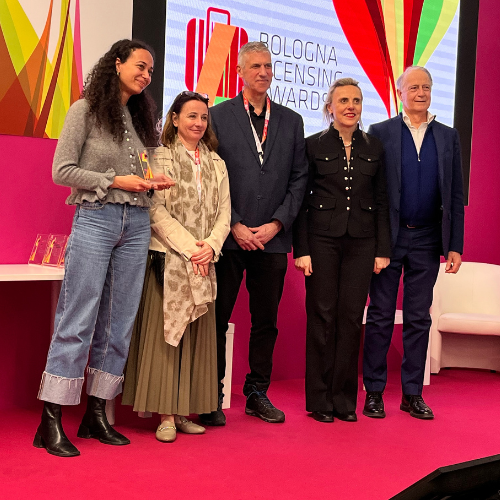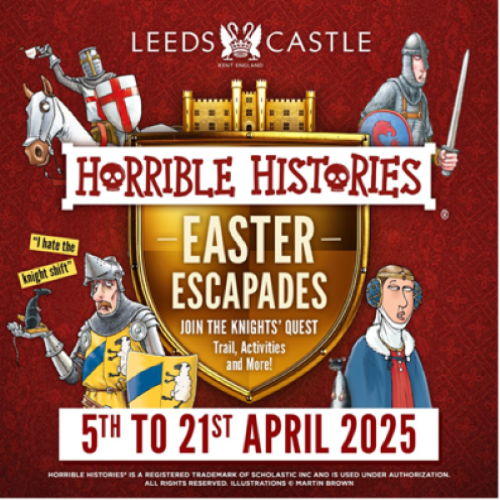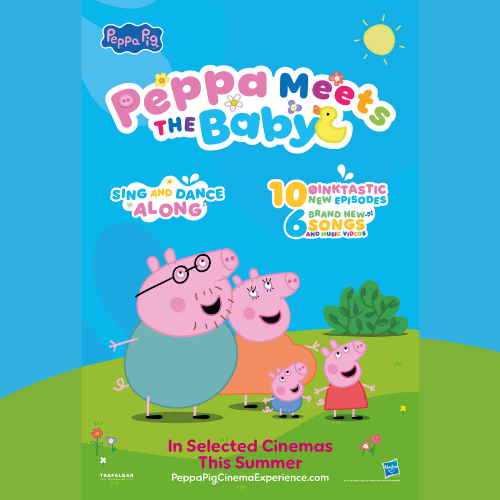Start Licensing’s Ian Downes takes a look at how the tradition of licensed annuals is evolving in the marketplace with new publishing formats this week.
There are certain product moments in the licensing year that create a sense of rhythm to the year.
One of these is the publication of a range of licensed and non-licensed annuals. This is a publishing event that reaches beyond the book trade into non-traditional book outlets including supermarkets. Although that said, seemingly supermarkets are now a core component of the distribution mix for publishers of licensed books so maybe no longer right to call this non-traditional distribution.
Annuals used to be the ‘best of’ a specific comic title and were published once a year in the run up to Christmas as a celebration of a particular title and they became a traditional gift for young readers. DC Thomson’s The Beano is a great example of this tradition and is a cornerstone of the annuals market. Although these days specific content is created for annuals. Licensing plays a big part in the annuals market with companies like Farshore, Penguin, DC Thomson, Centum and Little Brother Books playing a part in the category.
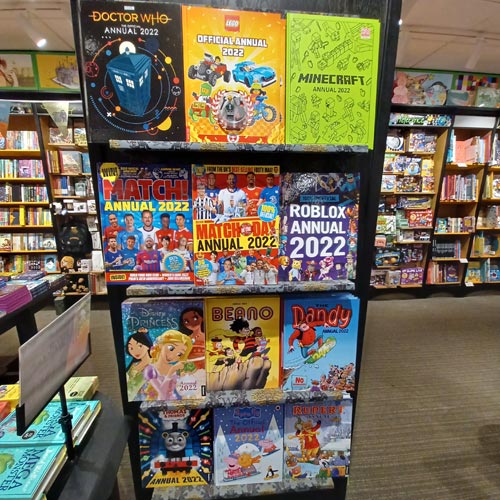
I saw two strong displays of annuals this week – one in WH Smith and the other in Waterstones. Interestingly their product mix was very similar. Featured titles in WH Smith included Match of the Day, Chelsea, Liverpool, Match, Rupert Bear and The Beano. Football is a big player in the annuals market.
LEGO also featured as did Pokémon – an indicator of two recurring themes in annuals gaming and toys. The vast majority of titles are officially licensed although from time to time ‘unofficial’ titles creep into the mix. I always think this is a shame and in this context an official title should always be the annual of choice, not least as it should be a stronger title. Although of course sometimes there isn’t an official title to stock.
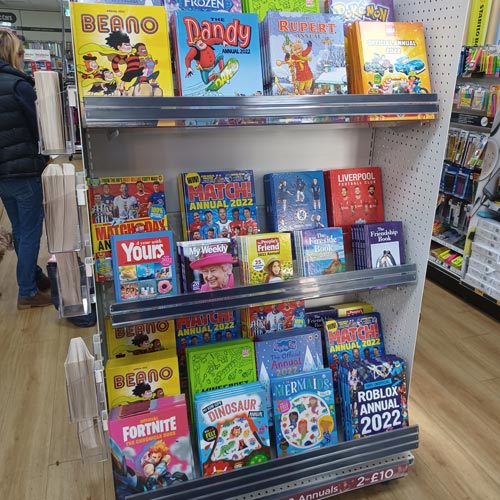
Interestingly WH Smith doe not confine itself to children’s titles only, as it carries a number of DC Thomson titles for more mature readers (including my mum ). These include titles based on popular magazines such as My Weekly and People’s Friend.
Waterstones offer wasn’t hugely dissimilar, but also included titles like Thomas the Tank Engine, Dr Who, Peppa Pig and Minecraft. For both retailers, annuals are clearly an important category at this time of the year. They probably draw in non-traditional book buyers and, of course, may lead onto other purchases while in-store.
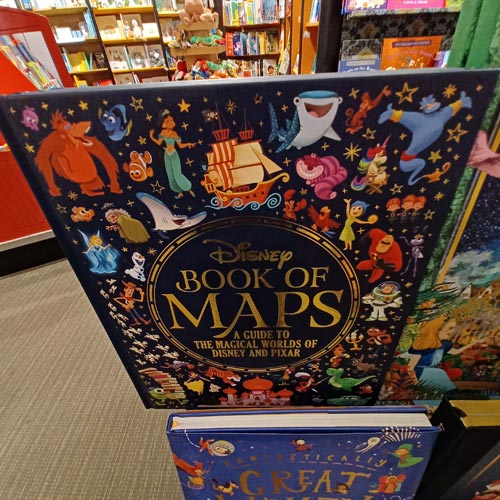
Publishers and licensors are also adding new formats to the publishing mix. I noticed a Disney Christmas Annual which seemed to be focused on Disney’s classic character portfolio and was a bit of a nod back to some of the comic publishing programme from the 1970s.
There were also quite a few examples of high spec books that seem to have been created for the Christmas gift market. A good example of this was a rather lavish book, Disney Book of Maps: A Guide to The Magical Worlds of Disney and Pixar. These books tend to be co-editions created for the global market and are central planks of publishing programmes. It is also a sign that most topics and formats have been tried, so publishers are working hard to find and explore new themes for licensed publishing.
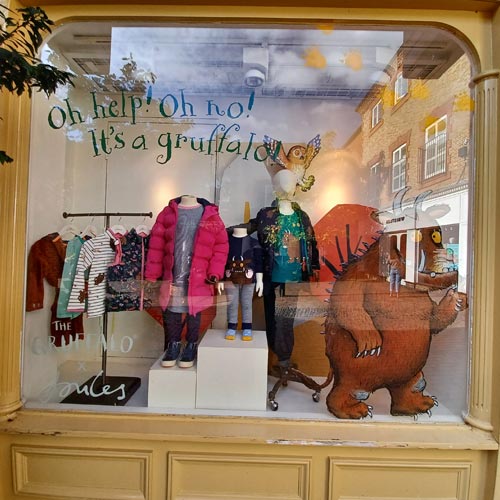
As always, it is interesting to see how retailers are using licensing in a more promotional fashion.
Joules is currently running a promotion with The Gruffalo which includes autumnal window displays that The Gruffalo is well suited to. Joules appears to have created a broad range of Gruffalo products including gilets, t-shirts, cardigans and accessories. Joules is also carrying items like family planners and backpacks.
This style of promotion and product partnership really showcases licensing well and shows how licensing can help retailers build an original offer. I suspect that we will see more retailers using this technique. Rights owners will no doubt find this an attractive proposition, but will be mindful that the commitment is a deep one in terms of product development and level of product buy.

I also noticed ladieswear retailer Whistles running a promotion with the film, The French Dispatch. This was very much a prize promotion with the chance to win £1,000 rather than a product driven promotion, but it is a good example of how film companies are looking to retailers as partners to help create a ‘buzz’ around a film release. There is probably scope for more of these kind of activations, but also ones that do include a product element because as Joules and The Gruffalo show, product can really help bring a promotion alive and make it more tangible.
Garden centres also seem to have sprung into Christmas life recently. Squires in Farnham – which is part of a chain in the South East – has recently switched its stock over to its Christmas offer. While generic product makes up the bulk of the product offer in categories like cards and calendars, licensed product are a key part of their offering. Garden centres definitely take care with their buying and are seeking to reflect their consumer audience rather than just buying into standard products.
A good example is that Squires’ features a lot of Emma Bridgewater products which tie into other categories like ceramics, while it also features a lot of calendars and cards developed with heritage brands such as The National Trust and the RSPB. Wildlife and nature are big themes for it on calendars with products such as The Bird Photographer of the Year calendar and classic properties such as Thelwell.
There is, of course, room for classic characters such as Where’s Wally? and Me To You. It also had a FSDU from Medici Cards featuring Charity Card packs. While this is not licensing per se it is a reminder that charity cards are an important feature of the Christmas card offering and for some consumers it is part of their traditional Christmas shopping choice.
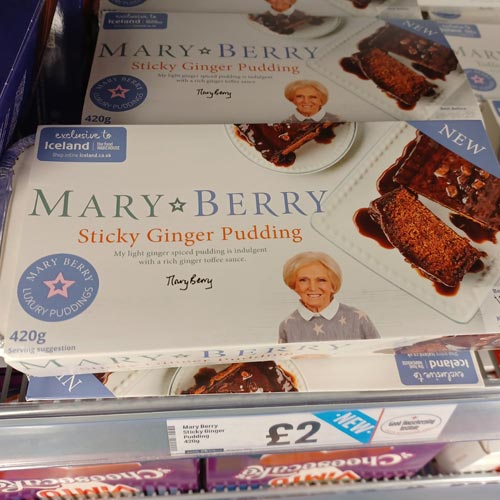
Finally, and remembering Iceland’s success at the B&LLAs recently, it is good to see it is not slowing down its efforts in licensing and the quest to secure exclusive products.
I noticed it has just launched two Mary Berry frozen desserts, while its store posters show new products using brands such as Chewits, McCoys, Cathedral City, Harry Ramsden’s and Ed’s Easy Diner. There seems to be no shortage of NPD energy and drive at Iceland. It recently announced that a new range of Ambrosia Custard Ice Cream will be in-store soon. Iceland is a great example of how creative thinking and brand licensing can produce strong results. It will be interesting to see if it has any Christmas NPD in the pipeline and if its competitors are thinking about what they can do in this space.
That said, Iceland already appears to have put a strong bid in to in win another B&LLAs award in 2022!
Ian Downes runs Start Licensing, an independent brand licensing agency. His Twitter handle is @startlicensing – he would welcome your suggestions for what to look out for.












